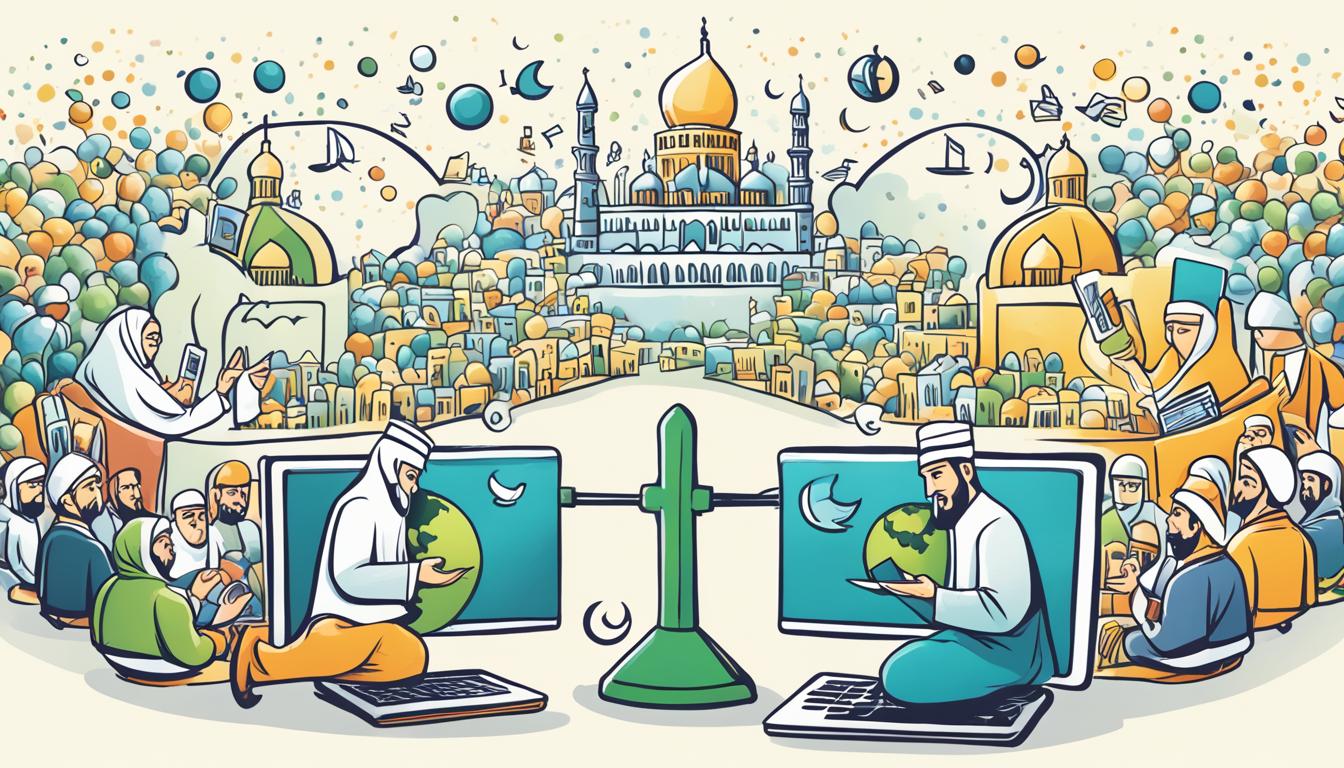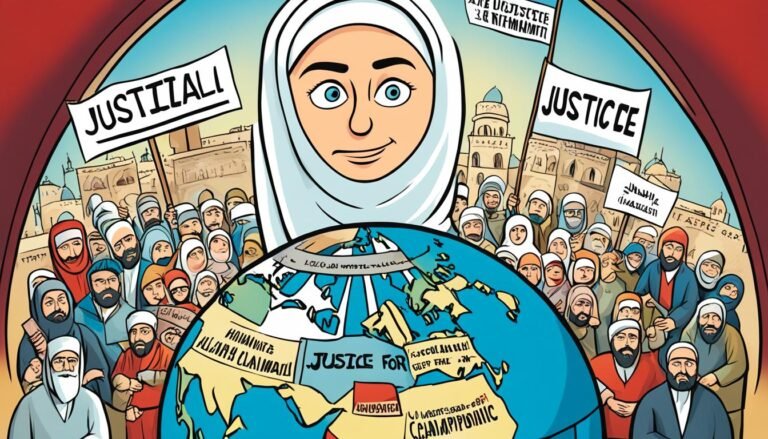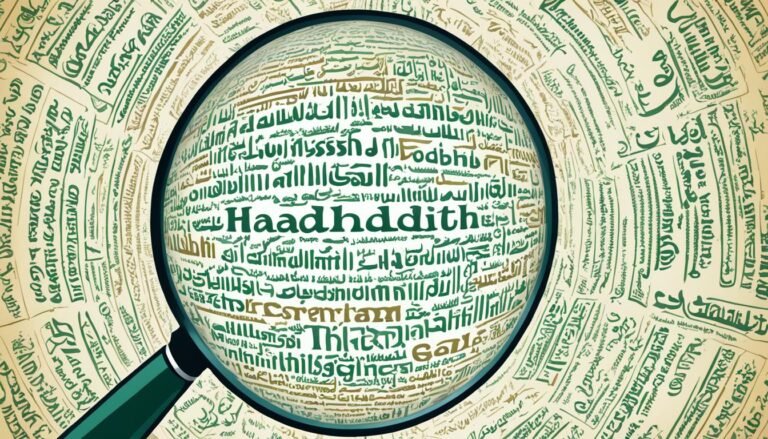The Impact of Social Media on Islamic Scholarship
Have you ever thought about how social media is changing Islamic scholarship? It’s making learning and talking about Islam easier, but it also makes us wonder about the quality of what we’re learning. Now, sites like Facebook, Twitter, and YouTube are key for learning Islam online. This is changing how we see digital Islamic knowledge.
Thanks to global connectivity, especially among young people, there’s a big interest in how social media affects Muslim teens. A study found that media has greatly changed how young Muslims see the world. They use social media for fun and to learn about Islam. In places like Pakistan, social networking has grown a lot since 2002.
A study in Indonesia showed that almost all students think social media helps them learn about Islam. These sites are more than just ways to connect. They help young people find their identity and understand Islam better. This makes us wonder: is social media leading to a new era of Islamic scholarship?
Key Takeaways
- Social media platforms are crucial for expanding Islamic knowledge accessibility.
- The growth of digital tools can lead to shifts in traditional learning paradigms.
- Adolescents use social media for companionship and have become more involved in socio-culture.
- Studies show that students find social media beneficial for delivering preaching.
- Global connectivity through social media enhances the dissemination of Islamic teachings.
- Authenticity and quality of information remain important challenges in digital Islamic education.
Introduction to Social Media and Islamic Scholarship
Social media has changed how we talk and connect with each other. It affects many parts of our lives, including how we see social media and Islam. Muslims make up about 24.9% of the world’s population and use social media a lot, with 1.9 billion followers worldwide.
This shows how important social media is for sharing Islamic teachings and connecting with others. Young Muslims in countries like Indonesia are really into social media too. In 2021, Indonesia had about 136.96 million Facebook users, showing how big social media is for learning about Islam.
Facebook is also huge in the Arab world, with over 45 million users. It’s a key place for sharing knowledge and connecting with the Islamic community. This shows how social media is changing the way we learn and interact with each other.
Islamic scholars and teachers are now using social media to reach more people. This change moves us from traditional learning to digital ways of learning. Young people are now looking to social media for learning and spiritual growth. This gives them quick access to religious teachings, helping them understand more and feel connected to their community.
The Role of Social Media in Modern Islamic Education
Social media has changed how we learn about Islam today. It’s like a global classroom where people from all over the world come together. YouTube is a key place for learning, offering lectures and talks on Islamic teachings.
Now, teachers use live streams and webinars to reach more people. Social media sites like Facebook, Instagram, and TikTok help teachers connect with students everywhere. This makes learning fun and interactive, sparking discussions and deepening understanding of Islamic knowledge.
More young Muslims are joining online classes because of social media. During the COVID-19 pandemic, many turned to these platforms for learning and staying connected. Young adults, especially those 16-22, are now using social media for school work, showing how important tech is in education.
Learning tools are getting better, mixing technology with traditional teaching. This mix helps make learning flexible and open to everyone. Leaders see the value of social media in teaching the next generation, supporting its role in education.
Digital Islamic Knowledge: Expanding Accessibility
In today’s world, digital tools have changed Islamic education a lot. Now, we have eBooks and online courses that make learning easier. This change helps more people get into Islamic texts and learn from each other easily.
Social media like Twitter and Facebook help Muslims from all over talk and connect. Scholars can reach more people and start discussions. These platforms make it easy to share and learn from each other, building respect and cooperation.
Leading scholars use online tools to share real knowledge with more people, especially those who can’t go to school. This helps make education fairer and fights wrong ideas about Islam. The Prophet’s words about sharing knowledge are very important here, showing us how to spread knowledge far and wide.
Students are now using digital tools to learn better, mixing online and offline learning. With smartphones and cheap data plans, learning is easier than ever. Teachers need to change how they teach to keep students interested and connected.
Social Media’s Effect on Online Islamic Education
Social media has changed how we learn Islam online, making it easier for people to connect and learn together. Now, 70 percent of internet users use social media, and 90 percent of young people do too. These digital spaces have become key places for learning.
Students from all over can now share their views on Islamic teachings online. This sharing makes learning more diverse and open to everyone. Famous figures like Dr. Zakir Naik and Mufti Monk use social media to share their ideas with many people, including both Muslims and non-Muslims.
But, social media also has its downsides. There are many distractions, and it’s easy to find wrong information. This shows why it’s important for students to learn how to tell real information from fake.
- Ease of Access: Social media makes it easy to share and learn about religious topics, like teaching the Quran and Hadith.
- Engagement: Sites like YouTube and TikTok are now places where people can talk openly about Islamic education.
- Varied Influences: A new group of influencers are making a mark in online Islamic discussions, knowing both religious and secular topics.
In conclusion, social media has many good points for learning Islam online. But, we must keep focusing on helping learners think critically. By teaching them to be aware and make good choices, we can make the most of social media’s benefits. This will help deepen their understanding of Islamic teachings online.
The Impact of Social Media on Islamic Scholarship
Social media has changed how young scholars learn and share knowledge in Islam. It has opened new ways to connect with people. Sites like Facebook, Twitter, and Instagram make learning more interactive and fun.
Shifting Learning Paradigms
Technology has changed how Islamic scholars teach and learn. Old ways of teaching are slowly changing. Now, young scholars use social media to make complex ideas easy to understand.
This new way of teaching helps create a community where everyone shares and grows together. It’s a place where knowledge is not just given, but made together by all.
Expanding Scholar Outreach
Social media has made it easier for scholars to reach more people. They can now talk to people all over the world. In countries like Pakistan, where media has grown a lot since 2002, social media is very popular among teens.
Through these sites, scholars can share important religious messages. They can also talk to young people who are eager to learn. This helps spread the message that learning is key to understanding the world and following Islam.
Social Networking and Islamic Discourse
Social networking platforms are key in shaping Islamic talk today. Sites like Twitter and Facebook are lively places for scholars and everyday people to talk and share ideas. They let Muslims worldwide swap thoughts and scholarly views easily.
Shaykh Mohammed Alarefe is a great example of how Twitter can reach many people. With over 20 million followers, he shows how social networking can spread Islamic ideas far and wide. This lets Islamic talks grow, with important topics being discussed and debated live.
Hashtags and online campaigns are now key for starting big discussions on social issues. They mix Islamic teachings with social actions. This mix helps scholars talk to the community, sharing their views on today’s problems.
In Saudi Arabia, for example, Twitter is huge, with about 500 million tweets each month. It’s a top choice for academics because it’s open and easy to use. Researchers like it for its clear data and helpful tools.
To show these points, here’s a table with some key stats:
| Statistic | Data |
|---|---|
| Total Participants | 248 |
| University Students Interviewed | 25 |
| Clerics Interviewed | 2 |
| Followers of Shaykh Alarefe on Twitter | 20 million |
| Monthly Tweets from Saudi Arabia (2015) | 500 million |
| Age Group with Most Instagram Users in Malaysia | 24-34 years |
| Percentage of Instagram Users Aged 18-24 in Malaysia | 30% |
Being active on social networks helps spread Islamic ideas and keeps the Muslim community learning and growing. As digital ways of talking change, so does Islamic learning, opening new doors for education.
Technology’s Role in Disseminating Islamic Knowledge
Today, technology has changed how we learn Islamic knowledge. Tools like podcasts, blogs, and online courses are key in this change. They make learning easy to access and fit different learning styles, reaching more people across the globe.
Studies show a big move from old ways of learning to new media among young Muslims. This change is due to fewer traditional classes, pushing people to look for online learning. Now, there are many online courses in Islam, making us wonder how effective they are and what they offer to learners.
The internet connects the online and offline worlds, making Islamic education better for young adults. It’s made the internet cheaper and more accessible, helping spread Islamic teachings. Research shows that Islamic websites are key in sharing knowledge, and online communities deepen their faith.
Sites like Twitter, Facebook, and blogs have changed how Muslims learn, question, and teach each other. Scholars like Mufti Ismail Menk and Numan Ali Khan use these platforms to spread their teachings. Their content connects with young people, bringing the community together and encouraging everyone to seek knowledge.
Social media is popular, with people spending a lot of time on it. This creates a sense of community but also worries about losing focus on spiritual life. Yet, the benefits of using digital tools for sharing Islamic knowledge are clear, showing a new way to learn about faith.
Challenges Faced by Islamic Scholars in the Digital Age
The digital age brings new challenges for Islamic scholars. They now face issues with sharing knowledge in a fast-paced online world. This change requires them to think deeply about how they share and understand information.
Information Overload
One big problem is information overload. Scholars and students are bombarded with too much content. This makes it hard to know what’s trustworthy and what’s not. Over 87% of Islamic scholars say they need better ways to find and organize information.
Being digitally literate is key. It helps them sort through all the information and keep their teachings true to their values.
Quality Control Issues
The digital world also makes quality control in education a big concern. Not all online content is reliable. Scholars must set clear rules for checking resources. Almost all scholars agree that ethics and technology must work together.
They want to create standards for online resources. This ensures they are trustworthy and maintain the high standards of Islamic scholarship.
Conclusion
Social media has a big impact on Islamic scholarship, playing both roles. It’s a chance and a challenge. Platforms like Facebook, Twitter, and YouTube help scholars share knowledge with more people. This makes learning about Islam easier and brings different communities together.
But, there are challenges like too much information and keeping quality high. Scholars need to be careful to share true knowledge. They should use new tech while keeping Islamic values.
Looking forward, working together is key. Scholars, teachers, and everyone else need to talk and work together. This way, social media can help Islamic scholarship grow. It will make sure knowledge spreads and communities get stronger.
Source Links
- Islamic Scholarship in Africa – Boydell and Brewer
- Social Media and Online Digital Technology Use Among Muslim Young People and Parents: Qualitative Focus Group Study
- Digital Islam and Muslim Millennials: How Social Media Influencers Reimagine Religious Authority and Islamic Practices
- naylA NASIR AL BALOUSHI
- Perspectives on Muslim Digital Worlds
- Potential Role of Social Impact Bond and Socially Responsible Investment Sukuk as Financial Tools that Can Help Address Issues of Poverty and Socio-Economic Insecurity
- “Islamic Algorithms: Navigating the Digital Age with Faith and Ethics”







